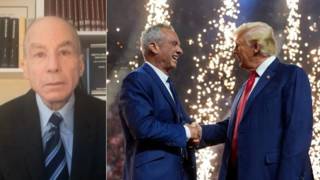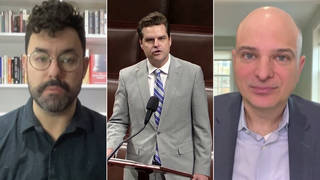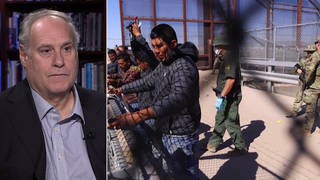
Related
As Mitt Romney surges in his bid for the Republican nomination, we take an in-depth look at his career and political record with reporter David Bernstein of the Boston Phoenix, who has covered Romney for many years. Bernstein details Romney’s shifting stances over the years on a number of key political issues to appease Republican voters in his bid for the party’s nomination. “The basic [Obamacare] system is entirely taken from what he did” with healthcare reform as Massachusetts governor, says Bernstein. Regarding Romney’s Mormon faith, Bernstein says, “Last time, in the 2008 election, he really was trying to win over … Christian conservatives, down in the South and in Iowa. And he tried to talk to them about his Mormonism and tried to convince them that it wasn’t that different from their religion. It really didn’t take.” [includes rush transcript]
Transcript
AMY GOODMAN: Our guest is David Bernstein, political writer at the Boston Phoenix who has been covering Mitt Romney for years. I wanted to step back for a minute, before we talk about his changing positions on immigration, David Bernstein, and Mitt Romney’s changing positions, for example, on healthcare in Massachusetts, on reproductive rights. Talk about Mitt Romney’s family. And I think also this goes to the issue of immigration, which he’s talked about. But talk about where Mitt Romney was born. Talk about his parents.
DAVID BERNSTEIN: Well, it really is two very separate stories. You know, it’s very much like a lot of us in America, where we have sort of our American story, you know, our personal story, and then the story of how we came to be here, you know, whether it’s Italian immigrants or Jewish immigrants. You know, in Mitt Romney’s case, it’s a very fascinating story of the Mormon story in American history, which his family is very much intertwined with, very central in. And at some point, one of his direct ancestors was essentially sent down to Mexico, first sent down to Arizona, to start a sort of enclave where polygamy, where multiple marriage for men, would be allowed, as the American government started to really crack down on it.
AMY GOODMAN: And talk about what happened in Mexico and his father’s birth, etc.
DAVID BERNSTEIN: I’m sorry. So, his father was then born—you know, his ancestor was sent down to Mexico to start this enclave to—where polygamy would be allowed, as it was cracked down on in America. And then, so George Romney, Mitt’s father, was born down there. But then the family moved back into America as the Mormon Church stepped away from polygamy as a doctrine. So, George Romney came back to America when he was five years old. So he really has a purely American life, and a tremendously successful life, built himself up, you know, became a big figure in business and politics. And by the time that Mitt Romney was born, the youngest child of George Romney, George Romney was in Michigan, in a very tony suburb of Michigan, on his way to becoming governor of the state, and, you know, a very, very wealthy man. He was the head of a major American car company there in Michigan.
So that’s where, you know, Mitt comes in, is with this whole history, family history, which, you know, is largely separated from what you might think of as mainstream America. But then his story is very much one of privilege and power, as he was brought up in the George Romney household. George Romney, you know, he’s sort of become a little bit of a footnote historically, but at the time, in the 1960s, he was really thought of as one of the premier political figures, one of the most likely people to become president. He was sort of the Mitt Romney of his time, in a way.
NERMEEN SHAIKH: David Bernstein, can you say something—you’ve written about this, as well, about Romney’s association with the Marriott family, his work as a board member of the Marriott Corporation, and if—can you talk about that in light of his stance, and his changing stance, on immigration?
DAVID BERNSTEIN: Well, this is—I’ve brought this up. I’ve been surprised that it hasn’t been brought up in the campaign yet. You know, he has become very, very solid right-wing on this immigration issue, which he had always sort of been on that side, but, you know, as governor, he never really acted on it. He was—it wasn’t something he made very central to him, until he really began positioning himself, you know, in 2006, as he saw the opening on the right against McCain and Giuliani. Really, that whole campaign attacked McCain specifically on immigration, because McCain, of course, had sponsored the bill that included amnesty for immigrants, for undocumented aliens, and this year has gone after Rick Perry and others on this immigration issue, and Newt Gingrich now.
What’s interesting to me is that—he’s very close—the family goes way back with the Marriott family. And in fact, Willard Mitt Romney is named after John Willard Marriott, the founder of the company. And he served—Mitt served on the board for a long time and then left it for the Olympics, then came back and served again. Bill Marriott, the current head of the company and the head of the company throughout this whole time, is one of the top business leaders advocating for major immigration reform, including amnesty. Marriott, as a company, is one of the largest employers of immigrants in the United States. And Bill Marriott and others at the company have testified to Congress and have spoken publicly and advocated and spent money advocating for the idea that they cannot personally, you know, possibly verify every single person who they employ everywhere throughout the country as to their authenticity. And that’s specifically what Mitt Romney is saying, is that we have to make employers pay and sanction employers for not doing that kind of verification. It really seems to me very hypocritical. You know, why did he go back to the board, why did he serve on the board, while they were doing this kind of advocacy, if this is what he believed? And I think that it should be raised by his opponents.
AMY GOODMAN: And the Romney family, the Marriott family, very close for a long time, both prominent Mormon families. Mormonism is something that Mitt Romney is not mentioning very much in his campaign, is that right, David?
DAVID BERNSTEIN: No, he’s not very comfortable talking about it. He really felt—last time, in the 2008 election, he really was trying to win over—like I said, he was trying to run for the right, to the right, so he really was trying to get some of these social conservatives, Christian conservatives, down in the South and in Iowa. And he tried to talk to them about his Mormonism and tried to convince them that it wasn’t that different from their religion. It really didn’t take.
I don’t think that it’s the main obstacle for him with those folks. I think that a lot of them are just very wary of his position, you know, whether he’s really dedicated to their abortion positions, for instance, or their gay rights positions on some things and so forth, and now the healthcare issue. But it is an issue for him, and he’s not comfortable talking about it. It’s not something that he’s found a way to warm them over about. So he really doesn’t talk about it very much, which, you know, it’s—I don’t know if I blame him for that, but it is a little—a little strange, because it is very clearly a very major part of his life. You know, he’s a very strong man of faith and was a leader in the church in Massachusetts for many, many years. It’s clearly part of his life.
AMY GOODMAN: And before that, was a Mormon missionary in France, is that right?
DAVID BERNSTEIN: Absolutely. That’s right. And, you know, his family, very, very high-level individuals in the church and—you know, over many years, you know, over generations. His uncle, if I’m not mistaken, was actually one of the three individuals who were apparently in the room when God gave the word to stop the ban on black priests back in 1978. That’s how high the Romneys have been in the church. And he’s taken it up, and he’s talked about—you know, about his missionary work in France and how it sort of solidified his faith. And he’s been a very serious, you know, man of faith ever since.
NERMEEN SHAIKH: On Monday morning’s Fox & Friends, host Steve Doocy asked Romney if he’s courting the Latino community by bringing up the fact that his father was born in Mexico. Romney said he wished he could claim that he was Hispanic. Let’s just go to that clip.
STEVE DOOCY: The other night, when I saw you at one of the debates down there in Florida, you mentioned, for the first time in my memory, that your father was born—you were talking about that anti-immigrant allegation by Newt Gingrich. You were talking about how your father was born in Mexico. It’s the first time I had heard you say that. Is that helping you with the Latino community in Florida?
MITT ROMNEY: You know, I wish I could claim that I’m Hispanic. That would help me in the Latino community here in Florida and around the country. But my dad was born of American parents living in Mexico, so he was an Anglo at the time. And yet I’m very proud of the fact that he came to this country at a critical time, was helped to get on his feet by folks in this country. And he and his dad went around America, started a construction business. Ultimately, my dad went off and ran a car company. It’s an amazing land, of course, people coming here from all over the world seeking opportunity.
NERMEEN SHAIKH: David Bernstein, your response to what Mitt Romney said?
DAVID BERNSTEIN: Well, he doesn’t talk about that much, and never really has. I think that, you know, part of it was it was brought up. It was asked to him at a Univision forum. So, you know, it’s sort of been put in front of him. But he really has very actively sought out the Latino, particularly the Cuban-American, vote there in Florida, which tends to vote Republican, is a big part of the Republican primary vote, and which apparently he did very, very well in last night. So, you know, it’s not exactly making himself out to be, you know, an immigrant, because, as he was explaining, they were Americans living in Mexico at the time, his family, and were never really immigrants back into the country at that stage.
AMY GOODMAN: Right. If you’re born of American parents, wherever you’re born, you’re still an American citizen.
DAVID BERNSTEIN: Yeah, and—but I think what’s interesting about it, and why I think you will hear him talk more about George Romney, his father, and those—you know, as he described it, traveling the country and, you know, making himself into a self-made man, is because Mitt Romney has this real problem that he doesn’t have that kind of story to tell to create an empathy with his—with the voters. You know, he doesn’t have the tough times that he went through or the, you know, “I grew up the son of a steelworker or, you know, millworker,” or whatever it might be. He just doesn’t have that. He is a success story, no question about that, and he will talk about his successes, but he doesn’t have a story. And so, he has tended at times, like he did there, to tell his father’s story as if sort of it’s part of him. I think that it’s his way of sort of trying to get ordinary people to think of him as someone who can relate to them, where obviously he has a very big image problem of people thinking of him as a very wealthy person who has always been wealthy and powerful, who can’t relate to their specific—you know, and this has come up again and again, you know, the $10,000 bet and so forth.
AMY GOODMAN: David Bernstein, I wanted to—I wanted to switch issues for a minute to talk about his views on reproductive rights. Last January, I had a chance to speak with Salt Lake City Mayor Rocky Anderson, the former mayor, about the political record of Mitt Romney. The two became friends when they worked together on the 2002 Winter Olympics, and they had cross-endorsed each other, although Romney is a Republican and Rocky Anderson at the time was a Democrat. Now he’s an independent running for president, as well. But let me go to what Rocky Anderson had to say.
ROCKY ANDERSON: Well, I think the real Mitt Romney, the Mitt Romney we all knew and who served as governor of Massachusetts, was very reasonable, very moderate. He felt that Roe v. Wade should be the end of the debate on choice, supporter of stem cell research. He was not the right-winger that he seemed to be when he decided that he would run for president of the United States. And frankly, I’d like to see the old Mitt Romney come back, because I think that he’s the sort of people that could bring people together and not be so fiercely partisan.
AMY GOODMAN: When did he change?
ROCKY ANDERSON: The day that he decided to run for president of the United States.
AMY GOODMAN: That was former Salt Lake City Mayor Rocky Anderson, now also running for president. David Bernstein, if you could talk about Mitt Romney’s changing position on choice. Rocky Anderson, who knew him personally, said he was absolutely pro-choice.
DAVID BERNSTEIN: Well, you know, the big question that people ask is, did he become—is he really pro-choice and became pro-life to run for president, or is he really pro-life and became pro-choice when he was running in Massachusetts? It’s a great question. He certainly—his history, that we know of, from the Mormon Church when he was a leader there earlier in his life, very strict against abortion, certainly, you know, carrying out the church dictates at the time.
When he started getting interested in running for elected office in the early 1990s, he became very active in the pro-choice movement, frankly. He and his wife gave money to Planned Parenthood, went to Planned Parenthood events, were positioning themselves. It has been reported that they had polling, which I really don’t doubt, that they had polling showing that nobody who is anti-choice on this issue could win a statewide election in Massachusetts. So he made clear that he was pro-choice, effectively. He didn’t use that word, but he made clear that he was effectively pro-choice back in the early 1990s when he ran against Ted Kennedy for Senate.
When he was in Utah for those Olympic Games, he said some things to the press out there, when he was considering at the time possibly running for office in Utah, which is very pro—a very pro-life state. He said some things that made it sound like he was pro-life. Then, when he decided to run for governor, he was very adamant about the fact that he would respect Roe v. Wade, that personally respected Roe v. Wade, that even though he was opposed to abortion personally, which, you know, I’m not sure who isn’t, that he wouldn’t do anything to affect a woman’s right and access. But then, later, towards the end of his gubernatorial run, he changed on that, then began positioning himself stronger and stronger to the right as he geared up for the presidential run.
He points to—he says that there was a sort of a conversion moment that took place, I believe, in late 2004, early 2005, when he was meeting with a doctor or, you know, a scientist about something. But it doesn’t square up with his actions and rhetoric even for another year or two after that point. He sort of created that back story of a conversion experience. You can believe it or not believe it, but it doesn’t quite fit. But he’s certainly been very solidly on the pro-life side since then.
NERMEEN SHAIKH: David Bernstein, finally, on the question of healthcare, I want to turn to Mitt Romney’s victory speech last night in Tampa, Florida, where once again he criticized what he called Obamacare.
MITT ROMNEY: And one of the most personal matters of our lives, our healthcare, President Obama would turn decision making over to government bureaucrats. He forced through Obamacare, and I will repeal it.
NERMEEN SHAIKH: David Bernstein, your response? How much of what he refers to as Obamacare is in fact based on Romneycare?
DAVID BERNSTEIN: The basic system is entirely taken from what he did. You know, he put this system in place. It was a very creative system. They worked on it for a long time, a lot of different, you know, people at the table, left and right, a lot of compromises, a lot of innovative thinking. This was this idea of the connector, which basically allows individuals to purchase healthcare through a system that pools them together so they can get competitive rates and so forth. That was all—you know, came out of the Heritage Foundation, conservative foundation, which is why Mitt Romney liked it. He pushed it. That was his baby, got it passed. And then—
AMY GOODMAN: And David Bernstein, we just have 10 seconds. How is it working in Massachusetts? Although Mitt Romney seems to be very much running away from it right now and it’s what Newt Gingrich is slamming away on, and many of the Republicans are.
DAVID BERNSTEIN: There’s a great deal of myth being told. The system basically works. They need to work on the cost-containment side of it, which they’re trying to do right now. But it’s working very well. We have everyone covered, and it’s working, essentially, exactly how it’s supposed to. And it really is exactly the model for what they’re trying to do across the country. And the way that he’s talking about it is really very duplicitous, in my opinion.
AMY GOODMAN: Well, we’re going to leave it there. David Bernstein—we thank you very much for being with us—has written many articles on Mitt Romney, political writer at the Boston Phoenix.
This is Democracy Now!, democracynow.org, The War and Peace Report. When we come back, we are going to Brussels, Belgium, where Reed Brody has just landed, spokesperson for Human Rights Watch. He just came from Spain, where he’s daily been in the trial of the crusading judge, Baltasar Garzón, now on trial himself. Stay with us.












Media Options